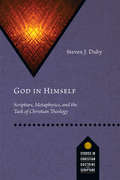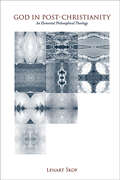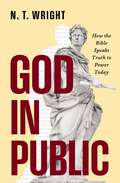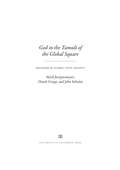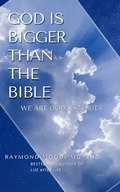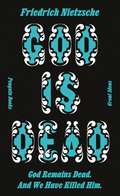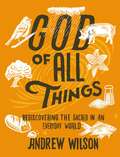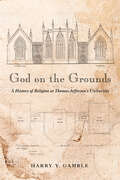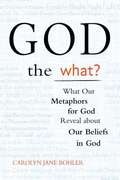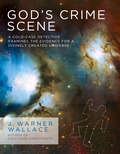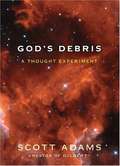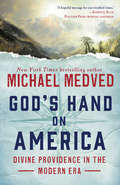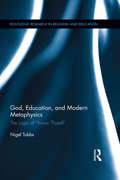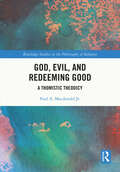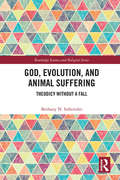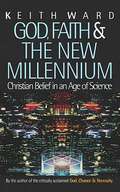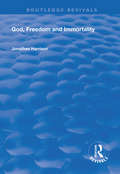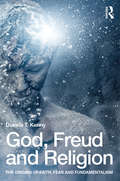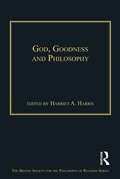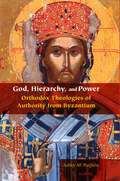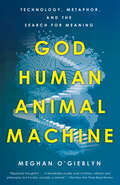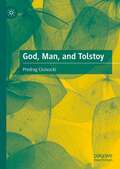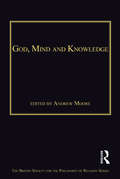- Table View
- List View
God in Himself: Scripture, Metaphysics, and the Task of Christian Theology (Studies in Christian Doctrine and Scripture)
by Steven J. DubyHow do we know God? Can we know God as he is in himself?
God in Pain
by Slavoj Zizek Ellen Elias-Bursac Boris GunjevicA brilliant dissection and reconstruction of the three major faith-based systems of belief in the world today, from one of the world's most articulate intellectuals, Slavoj Zizek, in conversation with Croatian philosopher Boris Gunjévic. In six chapters that describe Christianity, Islam, and Judaism in fresh ways using the tools of Hegelian and Lacanian analysis, God in Pain: Inversions of Apocalypse shows how each faith understands humanity and divinity--and how the differences between the faiths may be far stranger than they may at first seem. Chapters include (by Zizek) (1) "Christianity Against Sacred," (2) "Glance into the Archives of Islam," (3) "Only Suffering God Can Save Us," (4) "Animal Gaze," (5) "For the Theologico-Political Suspension of the Ethical," (by Gunjevic) (1) "Mistagogy of Revolution," (2) "Virtues of Empire," (3) "Every Book Is Like Fortress," (4) "Radical Orthodoxy," (5) "Prayer and Wake."
God in Post-Christianity: An Elemental Philosophical Theology (SUNY series in Theology and Continental Thought)
by Lenart ŠkofGod in Post-Christianity combines Eastern and Western influences into a dazzling survey of the contemporary theological landscape. Reading "the age of the Spirit" as "the age of the Breath," the book argues for a material, elemental, and sensory theology of God following the death of the ontotheological God of metaphysics. Drawing inspiration equally from Irigaray and Feuerbach, it offers a vision of God that is both feminist and humanist, a divine becoming for humanity, a sacred alliance with Nature. By presenting and analyzing the modern philosophies of Hegel, Schelling, and Merleau-Ponty, as well as such contemporary figures as John Caputo and Catherine Keller, and by drawing on unexpected, forgotten, or neglected sources such as Vedic poetry and American Mormonism and figures such as Averroes and Amalric of Bène, the book makes an original argument about God that resonates with currents in new materialism, comparative theology, and affect theory. Both speculative and mythopoetic, it is intended to forge a way forward for humanity to achieve the intersubjective and interreligious peace we all crave and deserve.
God in Public: How the Bible Speaks Truth to Power Today
by N. T. WrightDrawing on a collection of lectures that N. T. Wright delivered from 1999 to 2015, God in Public brings together the message of Jesus--in its larger biblical context--and the challenges of the contemporary public and political worlds.In this book, Wright challenges the West's response to 9/11 and then expands to discuss a more Jesus-inspired way of approaching the public problems we find ourselves in, based on following Jesus' life and teachings.As Wright demonstrates the many ways in which faithful exegesis of scripture can throw fresh light--God's light--on the great philosophical and ethical problems of our day, he discusses urgent questions such as: What has Christianity to do with power?Why must the church remind those in authority of their responsibilities?What can Christians do to act as the voice of the voiceless?
God in the Tumult of the Global Square: Religion in Global Civil Society
by Mark Juergensmeyer Dinah Griego John SoboslaiHow is religion changing in the twenty-first century? In the global era, religion has leapt onto the world stage, though often in contradictory ways. Some religious activists are antagonistic and engage in protests, violent acts, and political challenges. Others are positive and help to shape an emerging transnational civil society. A new global religion may be in the making, providing a moral and spiritual basis for a worldwide community of concern about environmental issues, human rights, and international peace. God in the Tumult of the Global Square explores all of these directions, based on a five-year Luce Foundation project that involved religious leaders, scholars, and public figures in workshops held in Cairo, Moscow, Delhi, Shanghai, Buenos Aires, and Santa Barbara. In this book, the voices of these religious observers around the world express both the hopes and fears about new forms of religion in the global age.
God is Bigger Than the Bible: We Are God's Stories
by Raymond MoodyDr. Raymond Moody looks at God and how his personal understanding of the Creator has changed over the course of his life and research into near-death experiences. Dr. Moody organizes his insights about God into 13 simple and profound ideas and walks us through them using stories and examples from his own life and from accounts of encounters with God in the hereafter. He looks at our society's beliefs about God, how religion can both help and hinder our relationships with the Divine, and how we can bring Source into our lives with a new understanding that transcends all limits.
God is Dead. God Remains Dead. And We Have Killed Him. (Penguin Great Ideas)
by Friedrich Nietzsche'We have left dry land and put out to sea! We have burned the bridge behind us - what is more, we have burned the land behind us!'Nietzsche's devastating demolition of religion would have seismic consequences for future generations. With God dead, he envisages a brilliant future for humanity: one in which individuals would at last be responsible for their destinies.One of twenty new books in the bestselling Penguin Great Ideas series. This new selection showcases a diverse list of thinkers who have helped shape our world today, from anarchists to stoics, feminists to prophets, satirists to Zen Buddhists.
God of All Things: Rediscovering the Sacred in an Everyday World
by Andrew WilsonAbstract theology is overrated, for God can be found in even the most ordinary of things. Jesus used things like a lily, sparrow, and sheep to teach about the kingdom of God. And in the Old Testament, God repeatedly describes himself and his saving work in relation to physical things such as a rock, horn, or eagle.In God of All Things, pastor and author Andrew Wilson invites you to rediscover God in this way, too--through ordinary, everyday things. He explores the idea of a material world and presents a variety of created marvels that reveal the gospel in everyday life and fuel worship and joy in God--marvels like:Dust: the image of GodHorns: the salvation of GodDonkeys: the peace of GodWater: the life of GodViruses: the problem of GodCities: the kingdom of GodGod of All Things will leave you with a deeper understanding of Scripture, the world you live in, and the God who made it all.
God of Many Names: Play, Poetry and Power in Hellenic Thought, From Homer to Aristotle
by Mihai I. SpariosuTracing the interrelationship among play, poetic imitation, and power to the Hellenic world, Mihai I. Spariosu provides a revisionist model of cultural change in Greek antiquity. Challenging the traditional and static distinction made between archaic and later Greek culture, Spariosu's perspective is grounded in a dialectical understanding of values whose dominance depends on cultural emphasis and which shifts through time.Building upon the scholarship of an earlier volume, Dionysus Reborn, Spariosu her continues to draw on Dionysus--the "God of many names," of both poetic play and sacred power--as a mythical embodiment of the two sides of the classical Greek mentality. Combining philosophical reflection with close textual analysis, the author examines the divided nature of the Hellenic mentality in such primary canonic texts as the Iliad, the Odyssey, the Theogony, Works and Days, the most well-known of the Presocratic fragments, Euripides' Bacchae, Aristophanes' The Frogs, Plato's Republic and Laws, and Aristotle's Poetics and Politics.Spariosu's model illuminates the many of the most enduring questions in contemporary humanistic study and addresses modern questions about the nature of the interrelation of poetry, ethics, and politics.
God on the Grounds: A History of Religion at Thomas Jefferson's University
by Harry Y. GambleFree-thinking Thomas Jefferson established the University of Virginia as a secular institution and stipulated that the University should not provide any instruction in religion. Yet over the course of the nineteenth century and into the early twentieth, religion came to have a prominent place in the University, which today maintains the largest department of religious studies of any public university in America. Given his intentions, how did Jefferson's university undergo such remarkable transformations?In God on the Grounds, esteemed religious studies scholar Harry Gamble offers the first history of religion’s remarkably large role—both in practice and in study—at UVA. Jefferson’s own reputation as a religious skeptic and infidel was a heavy liability to the University, which was widely regarded as injurious to the faith and morals of its students. Consequently, the faculty and Board of Visitors were eager throughout the nineteenth century to make the University more religious. Gamble narrates the early, rapid, and ongoing introduction of religion into the University’s life through the piety of professors, the creation of the chaplaincy, the growth of the YMCA, the multiplication of religious services and meetings, the building of a chapel, and the establishment of a Bible lectureship and a School of Biblical History and Literature. He then looks at how—only in the mid-twentieth century—the University began to retreat from its religious entanglements and reclaim its secular character as a public institution. A vital contribution to the institutional history of UVA, God on the Grounds sheds light on the history of higher education in the United States, American religious history, and the development of religious studies as an academic discipline.
God the What?: What Our Metaphors for God Reveal about Our Beliefs in God
by Carolyn Jane Bohler<p>"We do not have to let go of one sense of God to take up another. Neither do we need to go about challenging old metaphors. What is crucial is to find a metaphor--or two, or six--that creatively point toward what we believe." --from Chapter 1 <p>Let Carolyn Jane Bohler inspire you to consider a wide range of images of God in order to refine how you imagine God to have and use power, and how God wills and makes divine will happen--or not. By tapping into your God-given ability to re-imagine God, you will have a better understanding of your own beliefs and how you, God and the world relate to each other. <p>Wonderfully fresh and down to earth, Bohler uses playful images, moving stories and solid scholarship to empower you to break free of old habits and assumptions, whatever your faith tradition. She encourages you to explore new names for God that are not only more consistent with what you believe, but will also deepen and expand your experience of God. Think about ... <p> <li>God the Choreographer of Chaos <li>God the Nursing Mother <li>God the Jazz Band Leader <li>God the Divine Blacksmith <li>God the Divine Physical Therapist <li>God the Team Transformer <li>... and more</li> </p>
God's Crime Scene: A Cold-Case Detective Examines the Evidence for a Divinely Created Universe
by J. Warner WallaceThere are four ways to die, and only one of them requires an intruder. Suicides, accidental, and natural deaths can occur without any evidence from outside the room. But murders typically involve suspects external to the crime scene. If there's evidence of an outside intruder, homicide detectives have to prepare for a chase. Intruders turn death scenes into crime scenes. Join J. Warner Wallace, former atheist, seasoned cold-case detective, and popular national speaker as he tackles his most important case ... with you on the jury! With the expertise of a cold-case detective, J. Warner examines eight critical pieces of evidence in the "crime scene" of the universe to determine if they point to a Divine Intruder. If you have ever wondered if something (or someone) outside the natural realm created the universe and everything in it, this is the case for you.
God's Debris: A Thought Experiment
by Scott Adams"God's Debris" is a set of provocative questions (thought experiments) about God and science, wrapped in a fictional story. It is designed to inspire readers to question their views of reality.
God's Hand on America: Divine Providence in the Modern Era
by Michael MedvedThe national radio host and bestselling author of The American Miracle reveals the happy accidents, bizarre coincidences, and flat-out miracles that continue to shape America&’s destiny. &“A hopeful message for our troubled times . . . Michael Medved has an eye for a story, and a preternatural gift for telling it in beguiling ways.&”—Joseph J. Ellis, Pulitzer Prize and National Book Award–winning author of Founding Brothers Has God withdrawn his special blessing from the United States? Americans ponder that painful question in troubled times, as we did during the devastation of the Civil War and after the assassinations of the &’60s, and as we do in our present polarization. Yet somehow—on battlefields, across western wilderness, and in raucous convention halls—astounding events have reliably advanced America, restoring faith in the Republic&’s providential protection. In this provocative historical narrative, Michael Medved brings to life ten haunting tales that reveal this purposeful pattern, including: • A near-fatal carriage accident forces Lincoln&’s secretary of state into a canvas-and-steel neck brace that protects him from a would-be assassin&’s knife thrusts, allowing him two years later to acquire Alaska for the United States. • A sudden tidal wave of Russian Jewish immigration, beginning in 1881, coincides with America&’s rise to world leadership, fulfilling a biblical promise that those blessing Abraham&’s children will themselves be blessed. • Campaigning for president, Theodore Roosevelt takes a bullet in the chest, but a folded speech in his jacket pocket slows its progress and saves his life. • At the Battle of Midway, U.S. planes get lost over empty ocean and then miraculously reconnect for five minutes of dive-bombing that wrecks Japan&’s fleet, convincing even enemy commanders that higher powers intervened against them. • A behind-the-scenes &“conspiracy of the pure of heart&” by Democratic leaders forces a gravely ill FDR to replace his sitting vice president—an unstable Stalinist—with future White House great Harry Truman. These and other little-known stories build on themes of The American Miracle, Medved&’s bestseller about America&’s remarkable rise. The confident heroes and stubborn misfits in these pages shared a common faith in a master plan, which continues to unfold in our time. God&’s Hand on America confirms that the founders were right about America&’s destiny to lead and enlighten the world.
God, Education, and Modern Metaphysics: The Logic of "Know Thyself" (Routledge Research in Religion and Education)
by Nigel TubbsThe Western tradition has long held the view that while it is possible to know that God exists, it nevertheless remains impossible to know what God is. The ineffability of the monotheistic God extends to each of the Abrahamic faiths. In this volume, Tubbs considers Aristotle’s logic of mastery and questions the assumptions upon which God’s ineffability rests. Part I explores the tensions between the philosophical definition of the One as "thought thinking itself" (the Aristotelian concept of noesis noeseos) and the educational vocation of the individual as "know thyself" (gnothi seuton). Identifying vulnerabilities in the logic of mastery, Tubbs puts forth an original logic of education, which he calls modern metaphysics, or a logic of learning and education. Part II explores this new educational logic of the divine as a "logic of tears," as a "dreadful religious teacher," and as a way to cohere the three Abrahamic faiths in an educational concept of monotheism.
God, Evil, and Redeeming Good: A Thomistic Theodicy (Routledge Studies in the Philosophy of Religion)
by Paul A. Macdonald Jr.This book offers an original contribution to debates about the problem of evil and the existence of God. It develops a Thomistic, Christian theodicy, the aim of which is to help us better understand not only why God allows evil, but also how God works to redeem it. In the author’s view, the existence of evil does not generate any intellectual problem that theists must address or solve to vindicate God or the rationality of theism. This is because acknowledging the existence of evil rationally leads us to acknowledge the existence of God. However, understanding how these two facts are compatible still requires addressing weighty, wide-ranging questions concerning God and evil. The author draws on diverse elements of Aquinas’s philosophy and theology to build an argument that evil only exists within God’s world because God has created and continues to sustain so much good. Moreover, God can and does bring good out of all evil, both cosmically and within the context of our own, individual lives. In making this argument, the author engages with contemporary work on the problem of evil from analytic philosophy of religion and theology. Additionally, he addresses a broad range of topics and doctrines within Thomistic and Christian thought, including God, creation, providence, original sin, redemption, heaven and hell, and the theological virtues. God, Evil, and Redeeming Good is an essential resource for scholars and students interested in philosophy of religion, philosophical theology, and the thought of Thomas Aquinas.
God, Evolution, and Animal Suffering: Theodicy without a Fall (Routledge Science and Religion Series)
by Bethany N. SollerederAfter the publication of On the Origin of Species in 1859, theologians were faced with the dilemma of God creating through evolution. Suddenly, pain, suffering, untimely death and extinction appeared to be the very tools of creation, and not a result of the sin of humanity. Despite this paradigm shift, the question of non-human suffering has been largely overlooked within theodicy debates, overwhelmed by the extreme human suffering of the twentieth century. This book redresses this imbalance by offering a rigorous academic treatment of the questions surrounding God and the suffering of non-human animals. Combining theological, philosophical, and biblical perspectives, this book explores the relationship between God and Creation within Christian theology. First it dismantles the popular theological view that roots violence and suffering in the animal kingdom in the fall of humanity. Then, through an exploration of the nature of love, it affirms that there are multiple reasons to suggest that God and creation can both be "good", even with the presence of violence and suffering. This is an innovative exploration of an under-examined subject that encompasses issues of theology, science, morality and human-animal interactions. As such, it will be of keen interest to scholars and academics of religion and science, the philosophy of religion, theodicy, and biblical studies.
God, Faith and the New Millennium: Christian Belief in an Age of Science
by Keith WardKeith Ward offers a new interpretation of Christianity, presenting a faith in harmony with the scientific worldview, while remaining true to its traditions.
God, Freedom and Immortality (Routledge Revivals)
by Jonathan HarrisonPublished in 1999, this text offers a comprehensive treatment of the Philosophy of Religion. Its overall conclusions are that, though there is no reason to suppose there is a God, doing something that is not quite believing in god, who, as some mystics think - neither exists nor does not exist, may be valuable for some people.
God, Freud and Religion: The origins of faith, fear and fundamentalism
by Dianna T. KennyChoice Essential Read Did God create man or did man create God? In this book, Dianna Kenny examines religious belief through a variety of perspectives – psychoanalytic, cognitive, neuropsychological, sociological, historical and psychiatric – to provide a coherent account of why people might believe in God. She argues that psychoanalytic theory provides a fertile and creative approach to the study of religion that attempts to integrate religious belief with our innate human nature and developmental histories that have unfolded in the context of our socialization and cultural experiences. Freud argued that religion is so compelling because it solves the problems of our existence. It explains the origin of the universe, offers solace and protection from evil, and provides a blueprint about how we should live our lives, with just rewards for the righteous and due punishments for sinners and transgressors. Science, on the other hand, offers no such explanations about the universe or the meaning of our lives and no comfort for the unanswered longings of the human race. Is religion a form of wish-fulfilment, a collective delusion to which we cling as we try to fathom our place and purpose in the drama of cosmology? Can there be morality without faith? Are science and religion radically incompatible? What are the roots of fundamentalism and terror theology? These are some of the questions addressed in God, Freud and Religion, a book that will be of interest to psychoanalysts, psychologists and psychotherapists, students of psychology, psychoanalysis, philosophy and theology and all those with an interest in religion and human behaviour. Dianna Kenny is Professor of Psychology at the University of Sydney, Australia. She is the author of over 200 publications, including six books.
God, Goodness and Philosophy: Morality And Philosophy Of Religion (The British Society for the Philosophy of Religion Series)
by Harriet A. HarrisDoes belief in God yield the best understanding of value? Can we provide transcendental support for key moral concepts? Does evolutionary theory undermine or support religious moralities? Is divine forgiveness unjust? Can a wholly good God understand evil? Should philosophy of religion proceed in a faith-neutral way? Public and academic concerns regarding religion and morality are proliferating as people wonder about the possibility of moral reassurance, and the ability of religion to provide it, and about the future of religion and the relation between religious faiths. This book addresses current thinking on such matters, with particular focus on the relationship between moral values and doctrines of the divine. Leading scholars in the field test the scope of philosophy of religion, and engage with the possibilities and difficulties of attempting trans-faith philosophy. Chapters also relate to a number of cross-disciplinary contemporary debates: on evolution and ethics; politics, justice and forgiveness; and the relation between reason and emotions. Another set of chapters tests the coherence of Anselmian theism and concepts of an Omni-God in relation to divine knowledge and goodness. This book will be of interest to scholars and undergraduates in philosophy of religion, as well as moral philosophers, philosophers of science, theologians, and those working in theology and science.
God, Hierarchy, and Power: Orthodox Theologies of Authority from Byzantium (Orthodox Christianity and Contemporary Thought)
by Ashley M. PurpuraIn the current age where democratic and egalitarian ideals have preeminence, Eastern Orthodox Christianity, among other hierarchically organized religious traditions, faces the challenging questions: “Why is hierarchy maintained as the model of organizing the church, and what are the theological justifications for its persistence?” These questions are especially significant for historically and contemporarily understanding how Orthodox Christians negotiate their spiritual ideals with the challenges of their social and ecclesiastical realities.To critically address these questions, this book offers four case studies of historically disparate Byzantine theologians from the sixth to the fourteenth-centuries—Dionysius the Areopagite, Maximus the Confessor, Niketas Stethatos, and Nicholas Cabasilas—who significantly reflect on the relationship between spiritual authority, power, and hierarchy in theoretical, liturgical, and practical contexts. Although Dionysius the Areopagite has been the subject of much scholarly interest in recent years, the applied theological legacy of his development of “hierarchy” in the Christian East has not before been explored.Relying on a common Dionysian heritage, these Byzantine authors are brought into a common dialogue to reveal a tradition of constructing authentic ecclesiastical hierarchy as foremost that which communicates divinity.
God, Human, Animal, Machine: Technology, Metaphor, and the Search for Meaning
by Meghan O'GieblynA strikingly original exploration of what it might mean to be authentically human in the age of artificial intelligence, from the author of the critically-acclaimed Interior States. • "At times personal, at times philosophical, with a bracing mixture of openness and skepticism, it speaks thoughtfully and articulately to the most crucial issues awaiting our future." —Phillip Lopate &“[A] truly fantastic book.&”—Ezra Klein For most of human history the world was a magical and enchanted place ruled by forces beyond our understanding. The rise of science and Descartes's division of mind from world made materialism our ruling paradigm, in the process asking whether our own consciousness—i.e., souls—might be illusions. Now the inexorable rise of technology, with artificial intelligences that surpass our comprehension and control, and the spread of digital metaphors for self-understanding, the core questions of existence—identity, knowledge, the very nature and purpose of life itself—urgently require rethinking.Meghan O'Gieblyn tackles this challenge with philosophical rigor, intellectual reach, essayistic verve, refreshing originality, and an ironic sense of contradiction. She draws deeply and sometimes humorously from her own personal experience as a formerly religious believer still haunted by questions of faith, and she serves as the best possible guide to navigating the territory we are all entering.
God, Man, and Tolstoy
by Predrag CicovackiThis book examines Leo Tolstoy’s struggle to understand the relationship of God and man, in connection with his attempt to answer questions regarding the meaning of life. Tolstoy addressed such issues in a systematic way and with great concerns for the future of humanity. Predrag Cicovacki approaches Tolstoy both as a thinker and as an artist, and examines various sides of his intellectual and artistic engagement: his social criticism, his ambiguous relationship to nature, his understanding of art, and his attempted reconstruction of the true religion. By combining philosophical, religious, and literary analysis, Cicovacki undertakes an interdisciplinary study, showing much can be learned from Tolstoy's insights, as well as from his mistakes.
God, Mind and Knowledge (The British Society for the Philosophy of Religion Series)
by Andrew MooreThe themes of God, Mind and Knowledge are central to the philosophy of religion but they are now being taken up by professional philosophers who have not previously contributed to the field. This book is a collection of original essays by eminent and rising philosophers and it explores the boundaries between philosophy of religion, philosophy of mind, metaphysics, and epistemology. Its introduction will make it accessible to newcomers to the field, especially those approaching it from theology. Many of the book’s topics lie at the focal point of debates - instigated in part by the so-called New Atheists - in contemporary culture about whether it is rational to have religious beliefs, and the role these beliefs can or should play in the life of individuals and of society.
